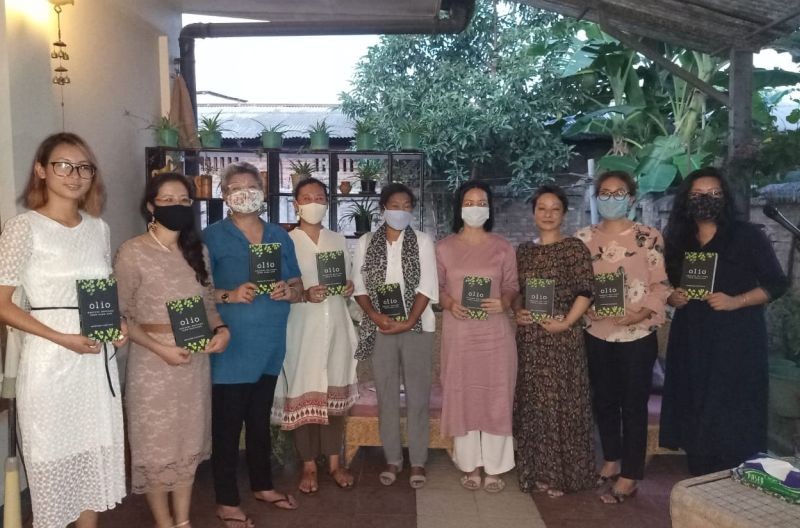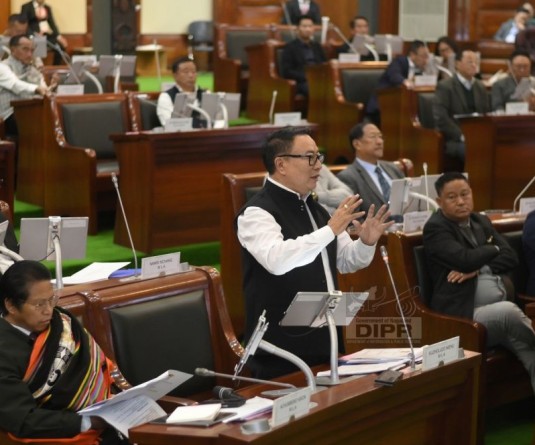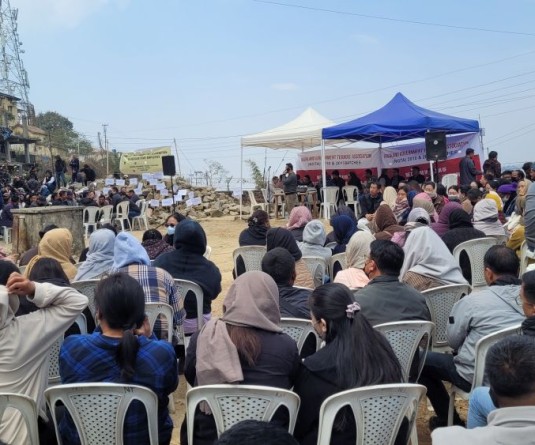Guest with the author and others during the launching of ‘Olio: Obscure Writings from Nagaland,’ the maiden project of Wordsmithereens at 80 Duncan, Dimapur on October 16.

Morung Express News
Dimapur | October 16
‘Olio: Obscure Writings from Nagaland,’ the maiden project of Wordsmithereens (the Nagaland Chapter of the North East Writers’ Forum) was released by I Anungla Aier, former director of Higher and technical Education, Friday during a small celebration at 80 Duncan, Dimapur.
An anthology of poetry, short stories and essays from the writers that make up Wordsmithereens, ‘Olio: Obscure Writings from Nagaland,’ is also the first book published by Tajung Publications which publishes Nagaland Page. The book was sponsored by Nagaland Page to commemorate its 20th Anniversary celebrations.
Speaking during the release, Dr S Elika Assumi, juxtaposed the writings in the book with the hardy and ubiquitous maidenhair fern which serves as an emblem on the cover of the book as well as the pages. She underscored that while the writings are repositioned beyond the subject- matter of folklore, it is also an avowal of our folk origins and oral traditions, which similar to the resilient fern, vies for a place in our fast-paced urbanity.
“These writings are as much a response to the contemporary as they are an attempt to understand its complexities,” she added.
In her publisher and sponsor’s note, publisher and editor of Nagaland Page Monalisa Changkija, recounted the early years of the NEWF’s Nagaland Chapter. She is also a founding member of the Forum and has been serving as its Advisor for two terms, including the present.
Changkija recounted that in the early years, the Nagaland chapter, which was then known by another name, was not active. But since 2018, more writers and poets of Nagaland became members of the Forum. It was then reinvented and renamed to Wordsmithereens which is a combination of the words—‘Words’ and ‘Smithereens,’ combined together to mean ‘pieces of words.’
Following these fresh turn of events, the 20th anniversary of Nagaland Page came about in May 29, 2019, and the Nagaland Page Family decided to mark the anniversary by investing in “endeavours that have the potential not only to enrich the lives of the disadvantaged but also sow seeds to help grow fruit-bearing trees in the future and leave an indelible literary mark, at least on the map of the Northeast to begin with,” she shared.
“When the Wordsmithereens decided to publish a volume of poem, short stories and essays, I saw a chance for Nagaland Page to chip in our bit,” she explained, while adding that it was also an awakening of a dormant dream and the imperative of nurturing and harnessing the talent, potential and enthusiasm of our young and not-so-young published and aspiring writers and poets.
With this sponsorship, Changkija hoped that the Wordsmithereens would move forward and generate their own income from this first volume for the next volumes.
Another aspect Changkija underscored in her speech was the absence of financial assistance for writers and poets. While there is financial assistance galore for musicians, sports-persons and all and sundry, in Nagaland, there is little or no financial assistance for writers and poets.
“Even the little financial assistance endowed by the Raja Ram Mohan Library, Kolkata, through the state Department of Art and Culture, for published works of writers and poets of Nagaland, has been shrouded in mystery by our Department of Art and Culture,” she said, highlighting her own experience as a writer.
Further, Changkija said that Tajung Publications, which had published only Nagaland Page in its almost 21 years of existence, would now publish other literary and non-literary works.
The publishing business, she said, is a very lucrative one. However, in India, “it is usually the publishing house that makes the big buck and the writer gets the name and the fame. While things have been changing over the past decade or so with the emergence of several online publishing opportunities, Changkija stated that it was “grossly unfair that the publishing houses earn the big bucks while the writers are left with a few copies as royalty and if they need to get more copies, they have to buy their own books.”
Terming it as a form of slavery, she asserted that writers and poets must not only earn but also profit from their labour. Moreover, none of us can afford a battery of lawyers and agents to make profitable deals for us, she added.
“This is where I envisage Tajung Publications to fill in the gap, till writers and poets of Nagaland reach commandeering heights to command our prices,’ she added.
Tajung Publications is not so much a publication/publishing business but more of a platform to introduce Nagaland’s writers and poets, at least to the Northeast reading public, to begin with, she maintained, while reassuring that “the writer/poet will earn the deserved due of her blood, sweat and tears.”
Speaking of her vision of Tajung Publications as the hearth around which tales were told by grandparents to rapt ears of newer generations in the days of yore, Changkija shared her dream of using Tajung Publications as the place to “recount the tales we need to tell for the world to know that we live.”
While the Wordsmithereens had planned a grand book release of ‘Olio: Obscure Writings from Nagaland,’ Changkija expressed her gratitude to its members, contributors and core group that turned the idea into something tangible.
Meanwhile, a message from Dhruba Hazarika, President of NEWF and former Chairman of the Assam Public Service Commission was also read out during the celebrations.
Hazarika shared that he was humbled by the sheer talent of the several of the talented poets and writers he met and remarked that “Several of the younger writers possess seminal thoughts wrought by a unique land and culture, of experiences and thoughts verging on dimensions that sometimes even words dare not intrude upon. Yet such has been the fervor in Nagaland, such the spirit that poetry and fiction have generated in all their majestic and oftentimes surreal parameters, that, driven by a timeless soul-hunger our poets and writers have poured out whatever warps they might have encountered before, making it as wholesome as it can be.”






